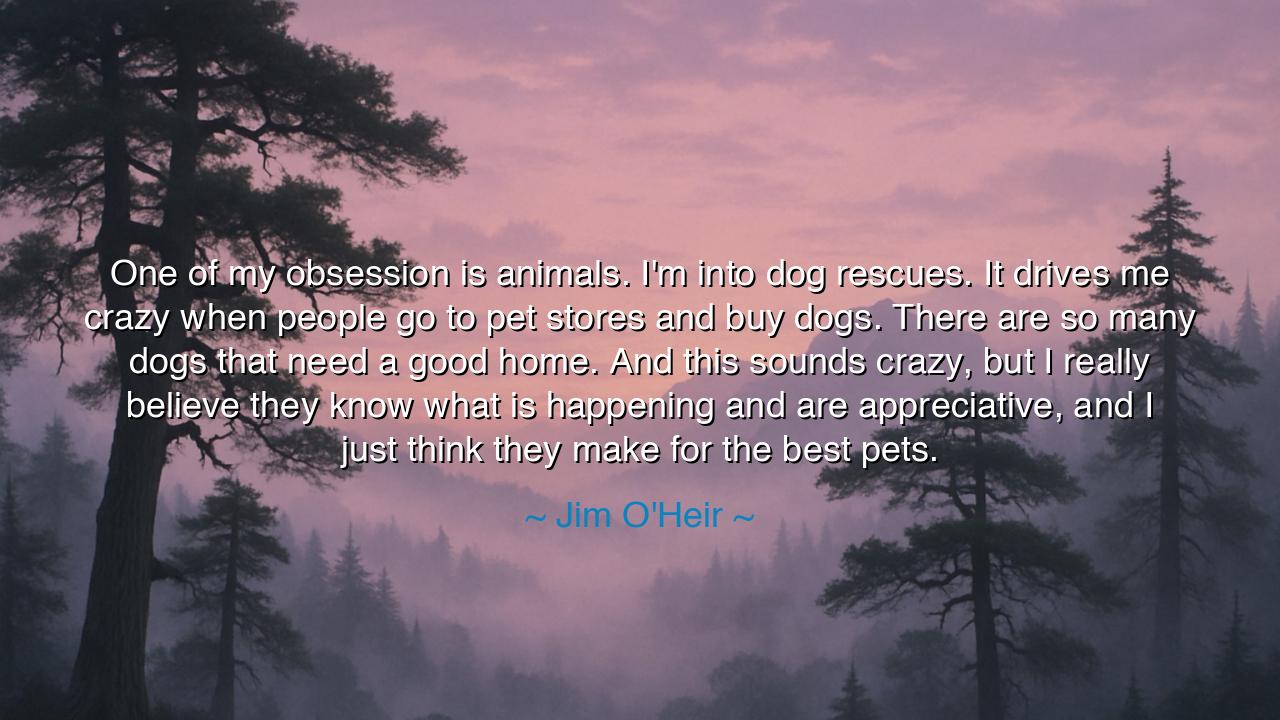
One of my obsession is animals. I'm into dog rescues. It drives
One of my obsession is animals. I'm into dog rescues. It drives me crazy when people go to pet stores and buy dogs. There are so many dogs that need a good home. And this sounds crazy, but I really believe they know what is happening and are appreciative, and I just think they make for the best pets.






In the words of Jim O’Heir: “One of my obsession is animals. I'm into dog rescues. It drives me crazy when people go to pet stores and buy dogs. There are so many dogs that need a good home. And this sounds crazy, but I really believe they know what is happening and are appreciative, and I just think they make for the best pets.” What may sound like the simple passion of a man for dogs is, in truth, a cry from the heart about compassion, responsibility, and redemption. For in these words lies a truth the ancients themselves would have understood: to care for the vulnerable is to strengthen not only them, but the soul of the one who cares.
The origin of this statement is grounded in O’Heir’s devotion to rescuing animals who have been abandoned, neglected, or left to die without love. His frustration toward pet stores is not mere anger, but an outcry against a system that treats living beings as commodities, as though loyalty and affection could be bought and sold. By contrast, dog rescues are acts of healing: the wounded creature is given another chance, and the human heart learns to see worth in what others had discarded.
This belief that rescued animals are “appreciative” may sound fanciful to some, but history is filled with stories that prove its truth. Consider the tale of Greyfriars Bobby, the little dog in 19th-century Scotland who, after his master’s death, remained faithfully by the man’s grave for fourteen years. Though he was cared for by the townspeople, it was clear that Bobby’s devotion came from a deep awareness of love and loss. In like manner, O’Heir reminds us that animals rescued from suffering often display a gratitude so profound it reshapes the lives of their rescuers.
In this sense, O’Heir’s passion reflects an ancient principle: that the measure of humanity is revealed in how it treats the weakest and most voiceless among it. Just as the shepherd of old was judged by how he tended the frailest of his flock, so are we judged by how we respond to the abandoned animals who fill our shelters. To rescue is not simply to provide food and shelter—it is to affirm the dignity of life itself, and in doing so, to become more fully human.
The deeper meaning of this quote is that love cannot be transactional. A purchased animal may bring joy, but a rescued animal brings transformation. In lifting another from despair, we ourselves are lifted. The bond between rescuer and rescued is forged not in convenience, but in the fire of suffering overcome. Such bonds are unbreakable, for they are born of compassion, patience, and trust rebuilt. O’Heir calls them “the best pets,” but what he truly means is that they become mirrors of redemption: living testaments to the power of second chances.
The lesson for us, then, is clear: choose compassion over convenience. If you desire a companion, look first to the shelters, the rescues, the forgotten places where life waits in cages for love. Do not fuel the market of commodification, but instead become a healer in a world that wounds too easily. And even beyond animals, apply this truth to all aspects of life: lift up the forgotten, the broken, the overlooked, and discover in them a loyalty and beauty deeper than anything purchased.
Thus, Jim O’Heir’s words, though spoken in love for dogs, become a timeless teaching for us all: to rescue is to redeem, and to redeem is to love. Let us therefore open our homes and hearts not only to the perfect and convenient, but to the wounded and discarded. For in their eyes we shall see gratitude, and in their companionship we shall find not only the best pets, but the best parts of ourselves.






AAdministratorAdministrator
Welcome, honored guests. Please leave a comment, we will respond soon